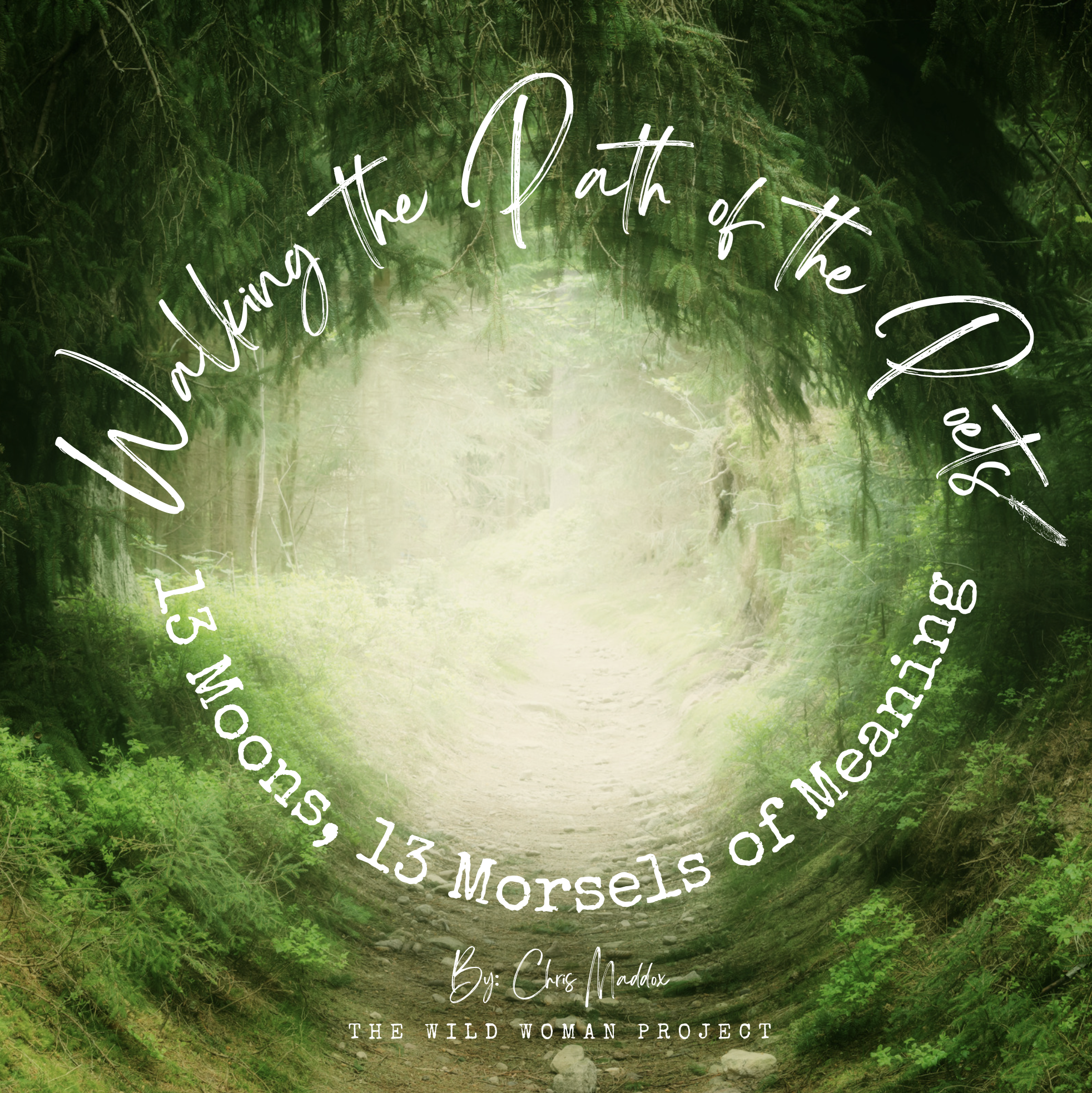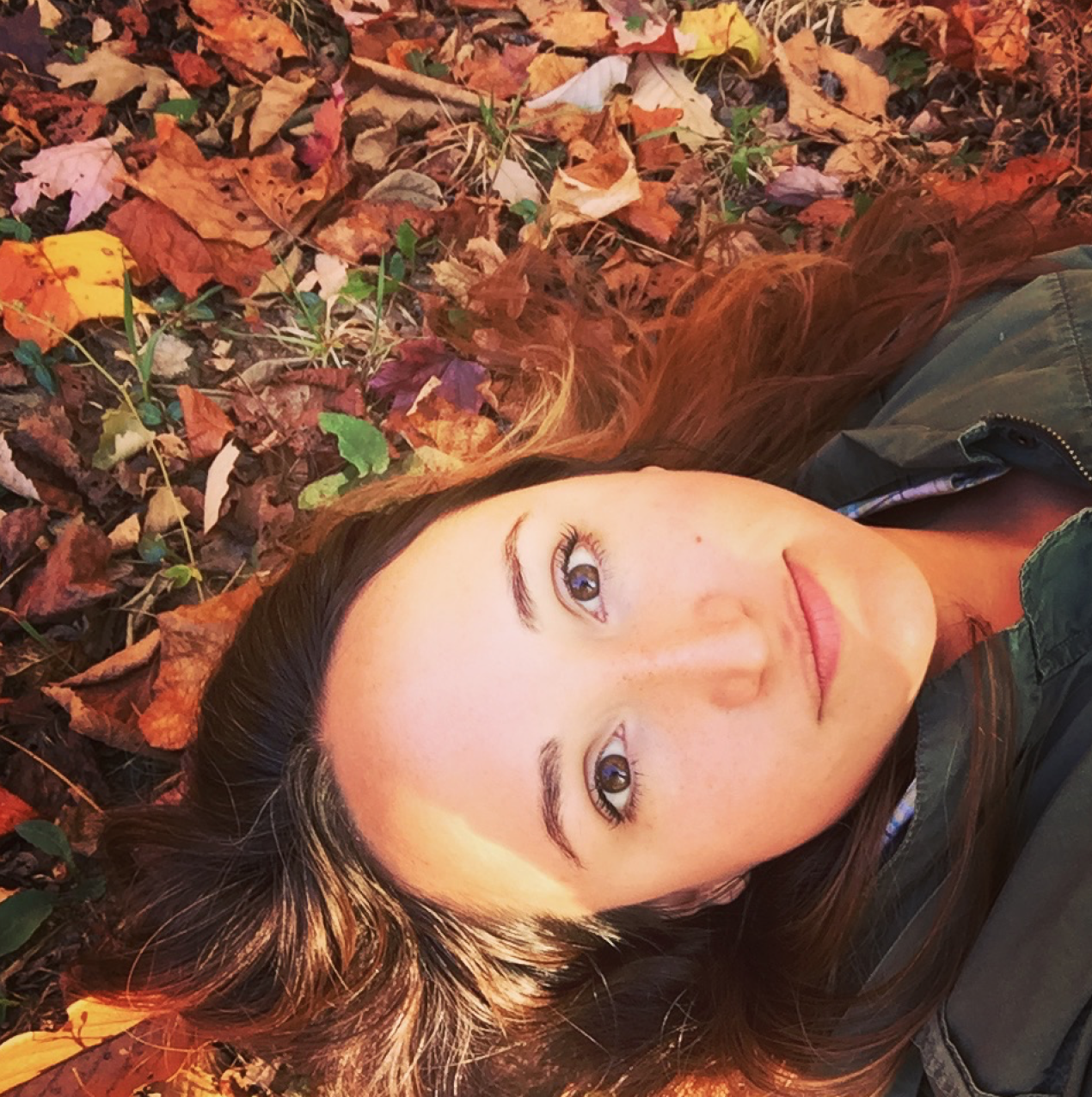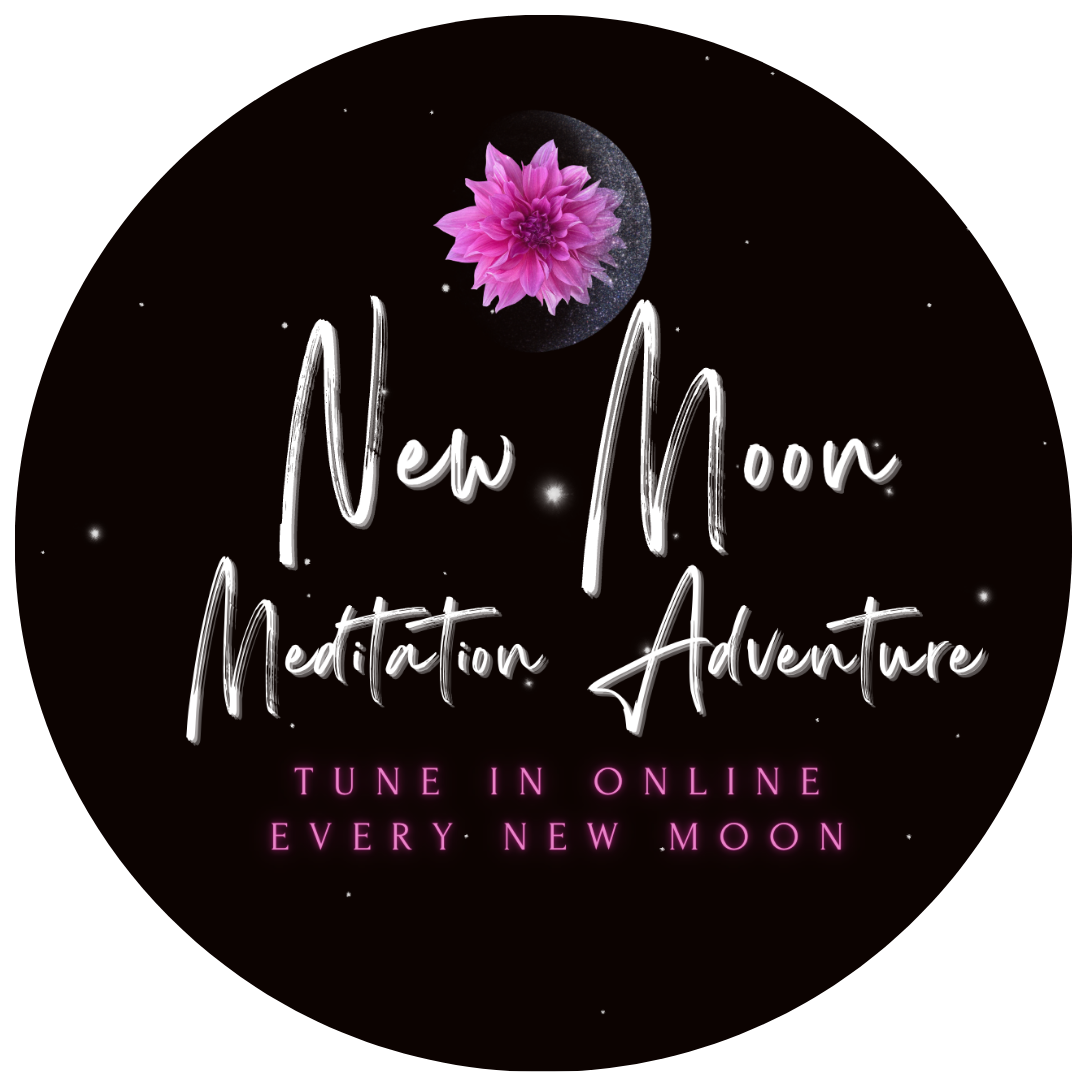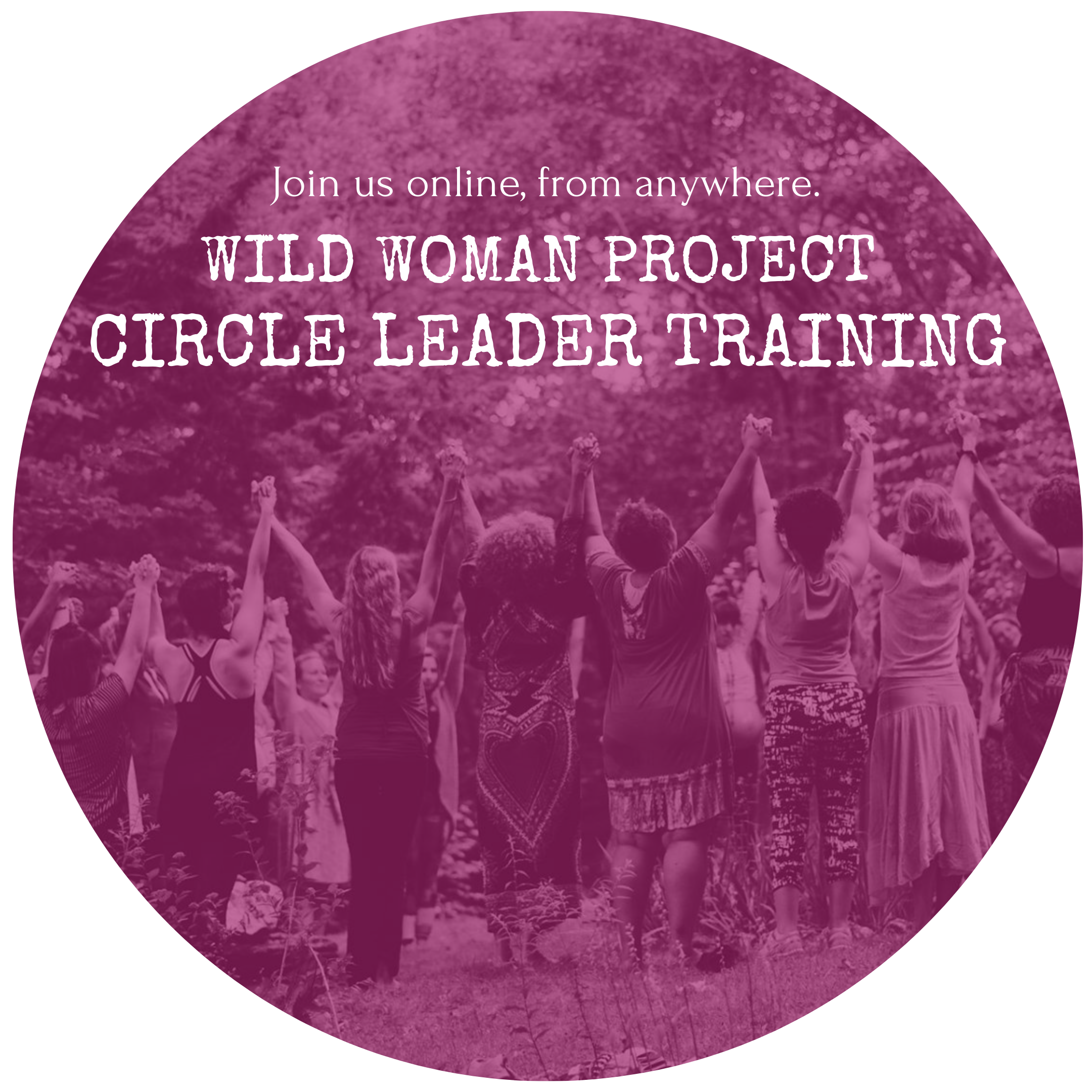Back in September 2021, we began a year-long journey with poetry. In circle and out, we turned our attention toward the varying perspectives of poets, who in their own way, embody the Wild Woman Archetype. This New Moon in August 2022 is our 13th and final of this adventure.
To celebrate the occasion, I invite you to walk with me as I take you through the 13 ideas, one from each poem that stirred or delighted or taught me something. Think of these as little morsels of meaning and let them melt on the tongue of your imagination.
1.
We begin, with Mary Oliver’s poem called,
“I Happened To Be Standing” where she contemplates the nature of prayers and lands on a moment where she is observing a wren singing in the morning “positively drenched in enthusiasm,” and thinks aloud:
“But I thought, of the wren’s singing, what could this be if it isn’t a prayer?”
What stays with me, is the reminder the wren offers: If you are going to do something, DO IT. Do it with all your heart. In that way, what is mundane can become, through our efforts, drenched in enthusiasm and take on a devotional dimension, making life more spiritually connected or prayerful.
2.
Joy Harjo, of the Muscogee Nation, two time Poet Laurette of the United States, guided us next,
in a poem about what happens at the kitchen table and how it relates to being human. In “Perhaps the World Ends Here” she speaks of all the essential and soulful activities that happen at the kitchen table, wonderful and terrible, positing, in the end:
“Perhaps the world will end at the kitchen table, while we are laughing and crying, eating of the last sweet bite.”
I carry in my heart, Harjos urge to savor life, the remembrance that for whatever reason, life on Earth, life as human beings, is full of paradox: birth and death, celebration and mourning, hope and despair. What we can do to make it more beautiful is the gather in the kind of way a kitchen table inspires: with family and friends, connected in our experience – whatever it is at that particular moment, savoring, together.
3.
Onward we journeyed into a poem called “On a Pink Moon” by Ada Limón, who coincidentally, during the course of this series had the Poet Laurette of the United States baton passed to her from Joy Harjo! In
this poem she writes through a kind of alchemical process of turning her anger & its shadow into a spell for growth and nourishment and remembrance of her belief that:
“We are the weeds.”
This perspective is one for the wild-hearted. Those of us who step out of line with prescribed norms can remember the dandelions who pop up to offer color and medicine in the most unexpected of places.
4.
Last December, Maya Angelou lit a candle in our hearts with her classic
“Phenomenal Woman”, a celebration of herself, her special way – a poem she often dedicated to all women.
“It’s the fire in my eyes,
And the flash of my teeth,
The swing in my waist,
And the joy in my feet.
I’m a woman
Phenomenally.”
Fire, flash, swing, joy – all evidence of this phenomenal woman. I will remember the healthy self-regard that Angelou embodies in this poem where she honors who and how she is, without shame.
5.
We began 2022 with
a poem written over a thousand years ago by Izumi Shikibu who wrote then of an experience so many of us modern wild women can deeply relate to. The feeling of watching the Moon and having an inner experience:
“I knew myself completely, no part left out.”
What stirs in the soul under the the Moon is nearly un-nameable, however Shikibu touches down on it for an instant – no part left out.
6.
Next we walked through a
poem of sisterhood, a kind of love letter written by one dear friend to another, one artist+activist to another. Alice Walker wrote “She” for Gloria Steinem and reflects on the amazing woman her friend is, over and over repeating, “She is the one…”:
“She is the one who warms your home with her fragrance; the one who brings music, magic & joy.”
What strikes me about this poem is the tenderness and reverence expressed, which is often relegated to the realm romance. I carry with me the remembrance to have awe for my wonderful friends and to make time and space to express it – unabashedly.
7.
We journeyed next into another poem from one friend to another. This time from woman to man, from one mystical writer to another, on the occasion of his passing: Dr. Clarissa Pinkola Estes to John O’Donohue.
In this poem, we get a window into Dr. E’s theology at a later time in her life, decades after the penned
Women Who Run With the Wolves. She describes death as traveling:
“…we may leave in this way or in that way.
But we are only traveling From our precious painted god on earth
To our precious star-rapt god of the cosmos
That we are not leaving
We are only traveling
Leaving god to go to god
And so it is for John
And so it will be for us one day
And thus we are together on the journey now
Some a little ahead
Some a little behind
But not apart
Not ever
We are all traveling together”
At a time when our relationship to death, as a human family, has been on the forefront of our thoughts, this mystical poem came in to offer perspective and maybe even a little peace around it, from the woman who gave us the language “Wild Woman Archetype.” Thank you to this poem, “The Painted Face of God.” It is one I plan on revisiting from time to time.
8.
In the first days of Spring, we dove in to
a prayer poem by the scientist-poet Diane Ackerman. Written for children as a possible school prayer, Ackerman walks through a prayer honoring all life, “wherever and in whatever form it may dwell”:
“I swear I will not dishonor my soul with hatred,
but offer myself humbly as a guardian of nature,
as a healer of misery,
as a messenger of wonder,
as an architect of peace.”
At a time when hatred has become a primary marketing/engagement strategy for media corporations, this poem serves as a kind of sacred vow to carry through the constant invitations to hate that we modern humans receive. To hate is to dishonor the soul, Ackerman offers. Instead we can become guardians, healers, messengers, and architects of a more beautiful culture.
9.
Near to Mother’s day, we ventured into
Nikki Giovanni’s poem which recollects vivid memories of her mother. One gets the impression that Giovanni, a mother herself, has evolved her perception of her mother and her relationship with her own mother. In the end, reflecting on a beautiful memory she writes:
“…we must learn to bear the pleasures as we have borne the pains.”
I will carry with me the gentle reminder to dwell as long in the beautiful moments and memories as we do the painful ones- a lesson for the ages.
10.
Next we saw through the eyes of Adrienne Rich as she pondered the phenomenon of life’s turbulence through the metaphor of a turbulent flight on a plane. Starting with, “There’ll be turbulence.” As close as a fact of life as you can get. Going on to write:
“The plane’s supposed to shudder, shoulder on like this. It’s built to do that. You’re designed to tremble too.”
This is a welcome reminder to not be surprised by turbulence -it is part of life and we were built for it. I hope to remember this in trembly moments which come from time to time. I am designed to endure it and so are you.
11.
In late June, we wandered into Anaïs Nin’s poem,
“Risk”, about growth and timing, using the metaphor of flower. This one long sentence and poem is an old favorite of mine:
“And then the day came,
when the risk to remain tight in a bud
was more painful than the risk it took to blossom.”
That moon cycle I used it as a mantra- that is a phrase to be repeated over and over – as I walked through the woods, gathering courage to blossom again, a poem-practice I highly recommend.
12.
In our final shared poem, we looked, once again to Mary Oliver, the Patron Saint of Wild Women. This time with her most beloved poem,
“Wild Geese”, which inspired the closing ceremony of our first live
Wild Woman Project Gathering in 3 years. It ends with an idea that both poetry & nature inspire:
“Whoever you are, no matter how lonely,
the world offers itself to your imagination,
calls to you like the wild geese, harsh and exciting,
over and over announcing your place
in the family of things.”
I walk forward with that remembrance: the world offers itself to your imagination. It inspires me to keep listening and paying attention and making and singing. It reminds me both of how tiny I am, and also, how majestic. We are all as much a part of this life as a rain drop is or a dragon fly. May we keep being enthusiastically ourselves, amid this enormous and mysterious web of life, of which we are a part.
13.
Choose your own adventure.
For this final New Moon of the Path of the Poets series, in Circles around the world, the facilitator is hand choosing a poem to explore in circle – one that inspires her.
Do you have a poem that inspires you? What is it? What excites you about the poem?
Please share in the comments below! Can’t wait to read them. ♥️






This poem isn’t from a wild woman, but a wise poet by the name of WB Yeats. The poet itself is in the 1 His poem “An Irishman Foresees His Death.” His wrote this poem after losing a friend in World War 1.
Despite the subject matter, this poems offers me the emphasis of Carling less about what is out of my control and how my reaction to it can only dictates of how the outcome affects me. Only the test of time stands by how I let it take control of me.
Those that I right, I do not hate,
Those that I guard, I do not love……… the years behind in balance with this life.”
Beautiful, Angel ♥️
Thanks so much for sharing.
Oh my, that was so nice to read back and reflect over the last years themes and poems, I thought I’d forgotten but reading your reflections allowed me to remember and was like oh yeah, in excitement for each poem. A years long theme I did not anticipate enjoying but I actually thoroughly felt deeply and inspiring. So thank you for your reflections chris, it took me back and boy oh boy i enjoyed all of them, they each allowed me to contemplate things i never thought id contemplate before x thank u for those gems x
My faves were risk and turbulence x
So glad it was a meaningful journey for you, Stacey 💜
Thanks for your reflection here and all you do!
WILD Geese is a old favorite poem of mine. It was in a book by Terry Tempest Williams. T he book was about loss. Her moms, the Salt Lake region in Utah. A beautiful writer. A nature activist , wild geese taught me of how much I love nature and how it heals me, and how I am a part of it. Mary Oliver and TTW. Are both wild woman that teach me, and challenge us to live, live wildly, live with enthusiasm and vigor.
Beautiful!
Thanks for sharing, Delores 💜